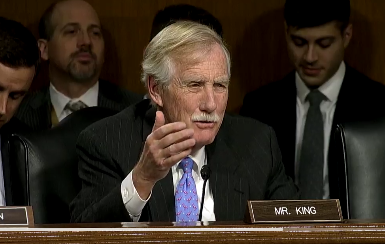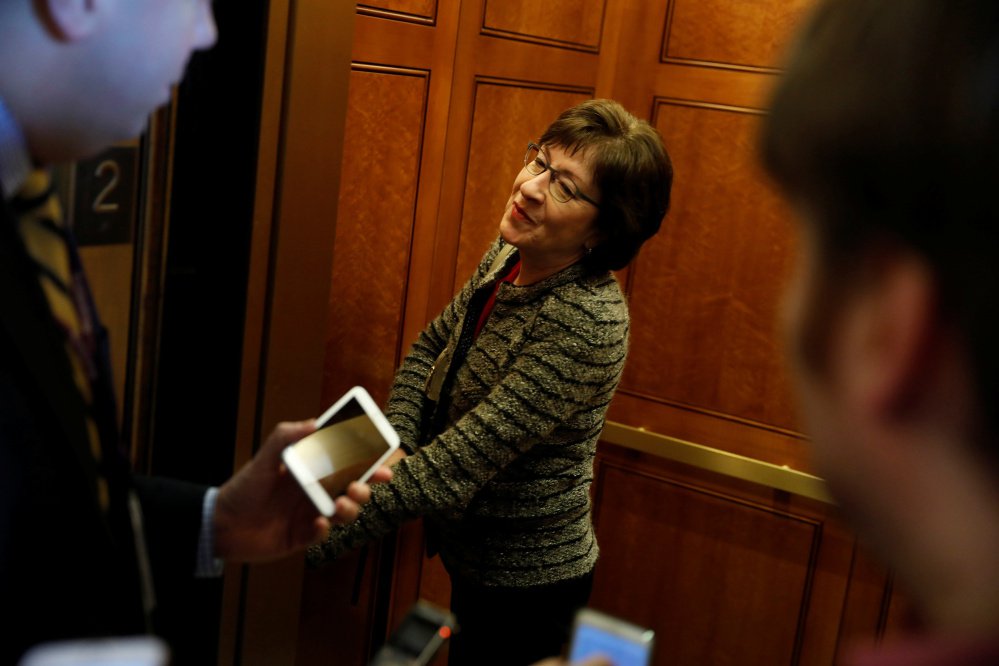Maine’s U.S. Sen. Angus King expressed heightened concerns Thursday about Russian attempts to infiltrate state election systems after he reviewed a trove of classified documents on Moscow’s campaign to influence the 2016 presidential race.
King said he spent “a couple of hours” Wednesday reviewing the classified documents at CIA headquarters as part of a Senate Intelligence Committee investigation into Russian involvement in the 2016 elections. While King said he could not provide any specifics, he said the documents provided “substantial backup” to the declassified Jan. 6 report from the Office of the Director of National Intelligence that concluded Russian government officials “ordered an influence campaign in 2016 aimed at the U.S. presidential election.”
One conclusion of the January report that received less attention than other aspects is that “Russian intelligence obtained and maintained access to elements of multiple U.S. state or local electoral boards.” Those systems were not involved in vote tallying, but King said the mere fact that a foreign government was probing state election systems should be a major concern to Americans.
“There appears to be little evidence that they succeeded,” said King, an independent who caucuses with Democrats. “But the fact they tried to penetrate state election systems, I believe, is very serious and something we need to take seriously before the next round of elections so that we are not prone to manipulation.”
America’s voting system is so decentralized – with its state and local controls – that a nationwide hacking incident is probably impossible. And most voting machines are not connected to the internet. But some states use digital machines without a “paper trail.”
King said that in a tight election, the manipulation of 100,000 votes in a specific area could make a difference. So the Maine independent and former two-term governor said the Russian meddling could mean that the federal government and states may have to take additional steps to ensure election systems are protected.
“They were not doing this for fun – they had intent,” King said of the Russian infiltrators’ efforts in the presidential race between Donald Trump and former Secretary of State Hillary Clinton. “They were practicing and probing.”
The CIA is making the “raw documents” that informed the Jan. 6 declassified report available to members of the House and Senate intelligence committees as part of their investigations into Russian involvement in the presidential race. Maine’s senators – King and Republican Susan Collins – hold two of the 15 seats on the Senate Intelligence Committee, which along with its House counterpart oversee the nation’s clandestine agencies and operations.
Collins is expected to review the CIA documents Monday, her office said.
The Jan. 6 declassified report came out roughly two weeks before Trump’s inauguration, heightening already sky-high political tensions around the country and fueling calls for congressional inquiries.
“We assess Russian President Vladimir Putin ordered an influence campaign in 2016 aimed at the U.S. presidential election,” reads the report, which was based on conclusions from the FBI, CIA and National Security Agency. “Russia’s goals were to undermine public faith in the U.S. democratic process, denigrate Secretary Clinton, and harm her electability and potential presidency. We further assess Putin and the Russian government developed a clear preference for President-elect Trump. We have high confidence in these judgments.”
Trump seemed to downplay the findings immediately after their release, tweeting the next day that “having a good relationship with Russia is a good thing, not a bad thing.” But the issue of Russian involvement in the election has not gone away in the months since, nor have questions about Trump campaign staffers’ dealings with Russian officials.
In the coming weeks, the Senate Intelligence Committee is expected to begin interviewing top officials from the CIA, the FBI and other intelligence agencies that were involved in monitoring or investigating the Russian meddling. While much of the committee’s investigation will likely take place in private because of the classified nature of the information, both King and Collins have said they hope some of the work will be done in public.
“I am urging that as much as possible of the committee work be done in public” after considering national security concerns, King said. “I think it is very important that the public understand what went on, what the Russians did and what Russia has been doing in other countries so that we can learn from this.”
Collins, who also has expressed strong concerns about the Russian actions, believes transparency is important in the ongoing investigations, spokeswoman Annie Clark said.
“She has encouraged the intelligence committee leaders to hold open hearings on the investigation wherever possible that would not jeopardize classified sources and methods, so that the American people can get a better sense of this important investigation that is well underway,” Clark said. “At the conclusion of the investigation, she believes it is imperative that the committee publish a public report on its findings.”
Trump’s most recent allegations – made via Twitter last weekend – that then-President Barack Obama ordered wiretaps at his Trump Tower offices also are receiving significant attention on Capitol Hill. The Trump administration has provided no evidence to substantiate the allegation, and Obama administration officials have flatly said the claim is untrue.
Collins has called on Trump to turn over any evidence to the intelligence committee, and King said Thursday that he believes the president’s claim will become part of the committee’s investigation.
“I think it is something that we are going to look at,” King said. “He has raised the issue and because we are going to be interacting with the FBI, we are certainly going to ask that question.”
Kevin Miller can be contacted at 791-6312 or at:
Twitter: KevinMillerPPH
Send questions/comments to the editors.




